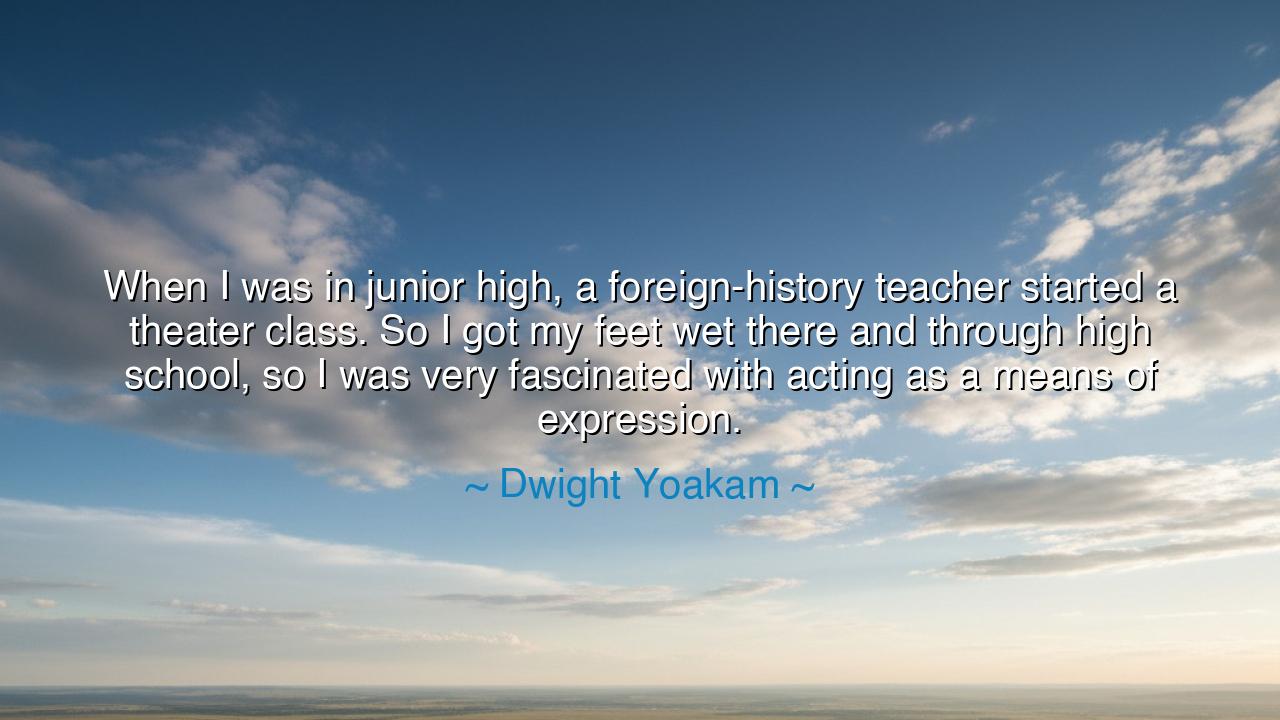
When I was in junior high, a foreign-history teacher started a
When I was in junior high, a foreign-history teacher started a theater class. So I got my feet wet there and through high school, so I was very fascinated with acting as a means of expression.






Hear the words of Dwight Yoakam, who looked back upon the shaping of his youth and declared: “When I was in junior high, a foreign-history teacher started a theater class. So I got my feet wet there and through high school, I was very fascinated with acting as a means of expression.” Though simply spoken, these words hold a depth of wisdom about the mystery of opportunity, the guidance of teachers, and the power of art to unlock the hidden chambers of the soul.
In this memory, the figure of the teacher looms large—not a master of the stage, but one who taught foreign history. Yet in his courage to begin a theater class, he planted a seed that would grow in the hearts of his students. From his willingness to offer something beyond his usual duties came the spark of destiny. Thus, Yoakam, who would one day give voice to countless songs and stories, first stepped into his calling not by grand design, but by the quiet generosity of one teacher’s choice.
The ancients knew this truth: the greatest gifts often come from unexpected places. Did not Socrates, who fought as a soldier, later become a philosopher who shaped the minds of Athens? Did not Leonardo da Vinci, trained as a painter, wander into anatomy, architecture, and invention, leaving behind treasures in every field he touched? Likewise, a history teacher became the gatekeeper of theater, opening a doorway for a young man to discover the power of performance as expression.
And what is acting, if not the art of becoming many while remaining one? For in the body of a single actor lives the warrior, the lover, the outcast, the king. Through the mask of another, the actor reveals his own deepest truths. Yoakam speaks of fascination, but beneath it lies something greater: liberation. By stepping onto the stage, he found a way to speak what could not be spoken in ordinary life, to express what the heart often hides. This is why art, in all its forms, has always been sacred to humanity—it frees what is bound, it gives voice to the silent, it unveils the soul.
History offers us the story of Euripides, who, in ancient Athens, used the stage not merely for entertainment, but for revelation. His tragedies questioned war, love, and the will of the gods, daring to give voice to women, slaves, and outcasts. He too saw theater as more than spectacle—it was a mirror of human truth, a tool of expression that reached deeper than any law or decree. Just as Euripides stirred a city, so too did that small school theater class stir the heart of Yoakam, setting him upon a road where art would be his lifelong language.
The lesson here is clear: never underestimate the power of beginnings. A single class, a single opportunity, a single word of encouragement may awaken in someone their life’s calling. For Yoakam, it was a history teacher’s experiment; for another, it may be a book, a song, a chance conversation. The key is to remain open—to try, to step in, to “get your feet wet,” as he says. For one never knows which small act will become the door to destiny.
Practical action flows from this truth. Teachers, do not fear to offer more than what is required; your small efforts may shape a life forever. Students, do not be afraid to try new things; in the unfamiliar may lie your true gift. And all who hear, remember: art is not only for those who make careers of it, but for all who seek expression. Write, sing, dance, or act—not for applause, but for the freedom it brings to the spirit.
So let the words of Dwight Yoakam endure: “A teacher started a theater class, and I became fascinated with acting as expression.” In them lies the eternal truth that opportunity, when met with openness, can transform a life. May you, too, remain attentive to the quiet invitations of fate, and may you embrace the arts not as luxury, but as a sacred means of becoming fully alive.






AAdministratorAdministrator
Welcome, honored guests. Please leave a comment, we will respond soon